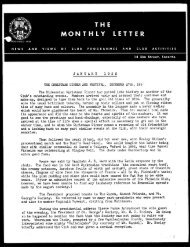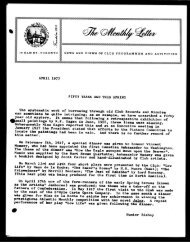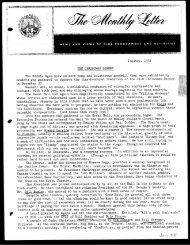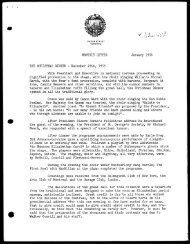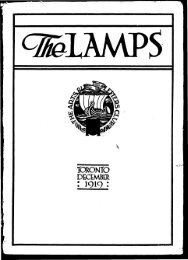MONTH LY LETTER
MONTH LY LETTER
MONTH LY LETTER
Create successful ePaper yourself
Turn your PDF publications into a flip-book with our unique Google optimized e-Paper software.
• 5 -<br />
In his enthusiastic book on Mahler, Bruno Walter compares the two composers<br />
and a short quotation may be of interest:<br />
"It is quite characteristic that Bruckner, in spite<br />
of the venerable simplicity of his mind, generally avoided the<br />
obvious and seemingly commonplace features which made, and still<br />
make, Mahler 1 s music shocking to many of his critics. Bruckner 1 s<br />
work is expressive of his conviction that the late romantic<br />
idiom was susceptible of unlimited evolution on its own terms}<br />
at any rate he did not worry about what should become of it.<br />
The disconcerting musical straightforwardness of Mahler, denounced<br />
by his adversaries as blatant and vulgar, is a striking<br />
foretoken of the great intellectual crisis which with extraordinary<br />
sensitivity he felt looming in the oncoming 20th<br />
century* His regression to primitive musical substances is<br />
more obvious and more far-reaching than Bruckner 1 s analogous<br />
trend. Both were quite clearly oriented toward Franz Schubert,<br />
but while one would always recognize Bruckner 1 s style as an<br />
organic development of the Schubert idiom, one is frequently<br />
struck by some of Mahler 1 s tunes which seem as if they were<br />
actually quoted from Schubert, though brought into a new,<br />
strange context•••••<br />
!l Both composers have in common the truly symphonic<br />
spirit, the propensity for the monumental simplicity of the<br />
fundamental themes, the sense of the magnitude of gesture.<br />
In Bruckner all that is an outgrowth of his unshaken faith in<br />
lasting progress} in Mahler it is arrived at through an everpresent<br />
exertion of will power, under the strain of the<br />
impending crisis of the symphonic form and the tonal idiom*<br />
To Bruckner, the Catholic of age-old tradition, his faith was<br />
unproblematical, like the air he breathed. To Mahler, who<br />
later underwent religious conversion, relation to the Supreme<br />
Being was a matter of endless concern and ever-renewed discussion.<br />
The actual sphere of common interest for Bruckner<br />
and Mahler was undoubtedly their admiration for Wagner....•"<br />
It is interesting to recall that the first performance of the St.<br />
Matthew Passion (in a shortened version) was that given by George D. Atkinson<br />
at Sherbourne St. Methodist Church in 1922. He directed his own augmented choir,<br />
and in addition to the organ and piano employed a double string quartet. Among<br />
the players who were members of the Arts and Letters Club, in addition to George<br />
Atkinson himself, were Frank Blatchford, Frank Converse Smith, Leo Smith and<br />
Horace Corner. Ernest Morgan assisted in the chorus.




